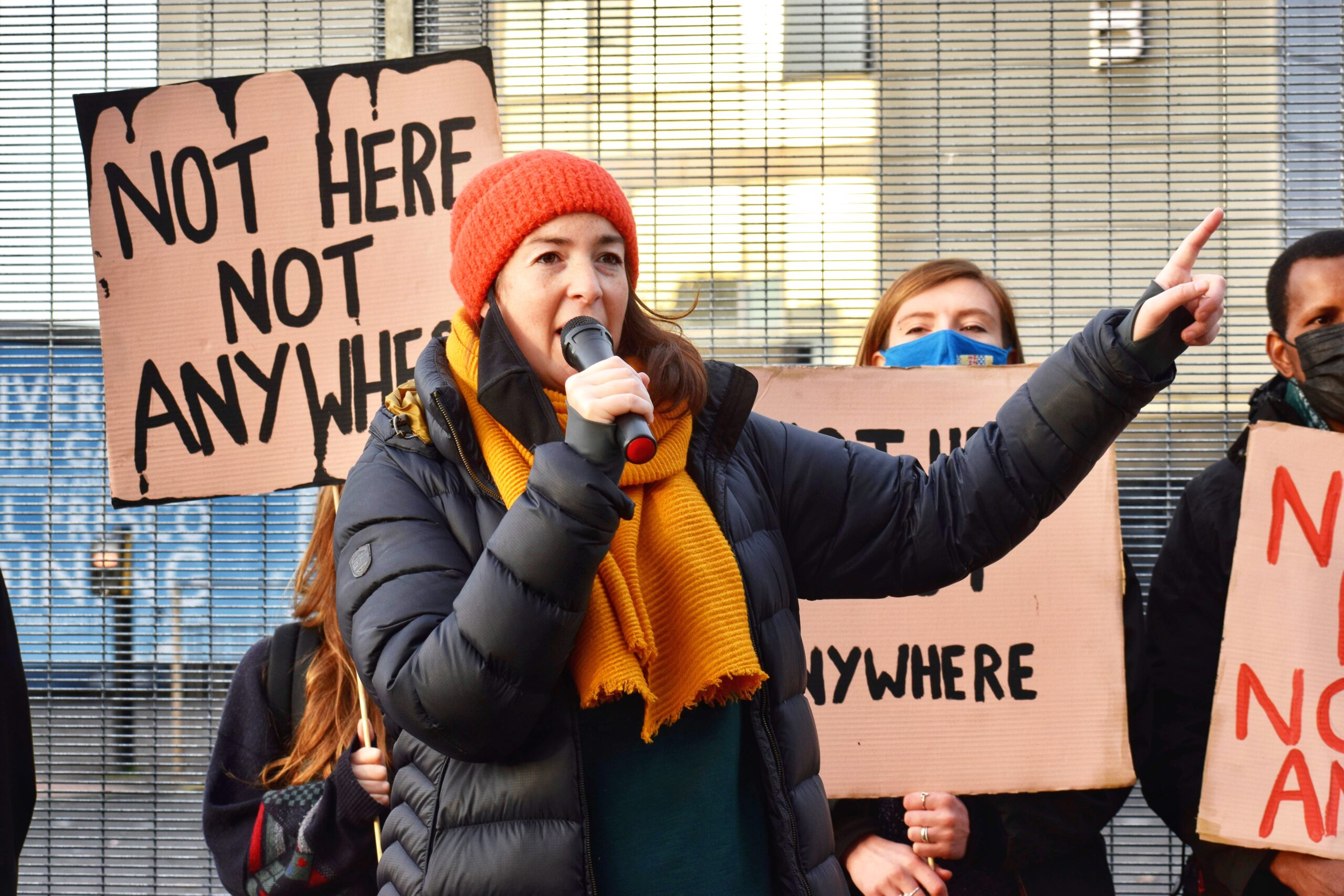
Transport Bill delivers suite of new powers to Councils to tackle Climate Emergency
The Transport Bill passed today (10/10/19) contains a raft of new powers for councils which campaigners say must now be used to cut climate emissions from how we travel around. Stage 3 of the Bill saw MSPs debating amendments relating to low emission zones, council-run bus services, pavement parking, and workplace parking levy powers.
The Transport Bill passes just two weeks after after MSPs unanimously agreed to increase Scotland’s 2030 climate emission reductions target to a 75% reduction from 1990 levels. Friends of the Earth Scotland say that, as transport is Scotland’s biggest emitting sector, these two new laws must work together coherently.
Key parts of the Bill debated and amended were:
- Workplace parking levy powers.
- Low Emission Zones.
- Public ownership of buses.
- Pavement parking and double parking.
Friends of the Earth Scotland’s Air Pollution Campaigner, Gavin Thomson, said:
“MSPs recently committed to rapidly bring down Scotland’s climate emissions. Transport is our worst polluting sector, and road transport emissions are actually higher than in 1990. The new powers delivered to councils must be used to discourage car use, improve public transport and make it easier and safer to walk or cycle. Local authorities, particularly our city councils, need to transition to greener transport, bringing benefits for air quality whilst also reducing our climate emissions.
“Air pollution is causing a public health crisis, with 2,500 premature deaths every year. Emissions from transport are responsible for a range of health problems, including heart attacks, stroke, and asthma, and young children and the elderly are particularly at risk. Low Emission Zones will improve the air we breathe, by restricting the most polluting vehicles from cities. It is hugely disappointing that MSPs chose to retain 6-year ‘grace periods’ which govern the speed of implementation of the Zones, as we know Councils need to move quicker to protect our health.
“The four city councils which will initially implement Low Emission Zones – Aberdeen, Dundee, Edinburgh, and Glasgow, now have the clarity they need, and we hope to see effective Zones that cover a wide area in cities being introduced quickly.
“Of all the proposals within the Bill, the workplace parking levy powers received the most coverage, and the most cynical distortion. Workplace parking levies have a track record of bringing much needed investment to transport infrastructure, and creating healthier places to live and work. They are an optional power being offered to councils, and Edinburgh and Glasgow Councils both formally asked the Scottish Government for this tool to cut traffic. It won’t be right for every area, but it will combat congestion and air pollution in our city centres. If MSPs are prepared to follow through on their climate commitments, they need to recognise this means changing our polluting, dangerous transport system. Cars must be deprioritised, and public transport needs investment and support.
“Let’s hope that all our councils covering towns and cities can look at this new suite of powers to plan a transport system free of fossil fuelled pollution.”
ENDS
Notes to Editors
1. Health impacts of air pollution:
– Friends of the Earth Scotland estimate that 2500 people die early each year from air pollution in Scotland alone: http://www.foe-scotland.org.uk/RCP-Report
– Air pollution, at levels seen on Scottish streets, has been linked with :
– Respiratory illness including asthma and COPD
– Heart attacks and strokes
– Low birthweight and delayed development in babies whose mothers have been exposed
– Poor lung development in children
– Dementia
– Children, the elderly, people with pre-existing health conditions, and sick are disproportionately affected by air pollution.
– (for more, see the Royal College of Physicians’ 2016 report, “Every Breath we Take: The lifelong impact of air pollution”: https://www.rcplondon.ac.uk/projects/outputs/every-breath-we-take-lifelong-impact-air-pollution)
2. LEZs were first proposed in 2015. The SNP 2016 Scottish Election manifesto promised a Low Emission Zone by 2018. The Glasgow SNP promised an LEZ for the city in their 2017 Council Election manifesto. In September 2017 the Government confirmed the first LEZ would be in Glasgow and there there would be further Zones in Aberdeen, Dundee and Edinburgh by 2020.
3. The amendments tabled for Stage 3 were collated here: https://www.parliament.scot/S5_Bills/Transport%20(Scotland)%20Bill/SPBill33AGS052019.pdf
Friends of the Earth Scotland’s briefing, recommending which amendments MSPs should have supported, is available here: https://foe.scot/resource/transport-bill-stage-3-briefing-msps/
4. Glasgow City Council formally asked the Scottish Government for Workplace Parking Levy powers.
https://www.glasgow.gov.uk/councillorsandcommittees/viewSelectedDocument.asp?c=P62AFQDN2UUTZL2UDX
City of Edinburgh Council replied to the Transport Bill initial consultation saying that Workplace Parking Levy powers should be added.
https://www.parliament.scot/S5_Rural/City_of_Edinburgh_Council_TB.pdf
The levy has worked well in Nottingham, introduced and run by a Labour council. https://www.citymetric.com/transport/why-other-cities-should-copy-nottinghams-revolutionary-parking-levy-2382
A previous Scottish Government, led by Scottish Labour, advocated for the Workplace Parking Levy. The measures were contained in a discussion document published by former Transport Minister Sarah Boyack on different ways to tackle Scotland’s increasing traffic congestion. http://news.bbc.co.uk/1/hi/uk_politics/392334.stm
5. Scottish Parliament has new Climate Legislation. 25 Sep 2019. https://www.stopclimatechaos.scot/climatebill/
In 2017, road transport was the largest source of emissions in Scotland. Road transport emissions have increased by 11.1 per cent between 1990 and 2017.
Transport (excluding International Aviation and Shipping) was responsible for 32.1% of Scottish Greenhouse Gas Emissions in 2017. https://www.gov.scot/publications/scottish-greenhouse-gas-emissions-2017/pages/3/
6. Majority of Scots back public ownership of bus services, new poll finds (July 2018) https://www.commonspace.scot/articles/12982/majority-scots-back-public-ownership-bus-services-new-poll-finds
7. Number of bus journeys in Scotland fall by 100 million over decade (Feb 2019)
https://www.bbc.co.uk/news/uk-scotland-47388550
Transport and Travel Statistics from Scottish Government (Sep 2018) https://www.transport.gov.scot/publication/transport-and-travel-in-scotland-2017/sct08183658301-11/
8. SPICe report on buses in Scotland. Page 9 highlights regional differences in the falling of passenger numbers. https://sp-bpr-en-prod-cdnep.azureedge.net/published/2018/9/3/Transport–Scotland–Bill–Buses/SB%2018-54.pdf
9. Free-to-use photos of protests calling for better public transport are available here: https://flic.kr/s/aHsmEcX3yW
10. Friends of the Earth Scotland is
* Scotland’s leading environmental campaigning organisation
* An independent Scottish charity with a network of thousands of supporters and active local groups across Scotland
* Part of the largest grassroots environmental network in the world, uniting over 2 million supporters, 75 national member groups, and some 5,000 local activist groups.
